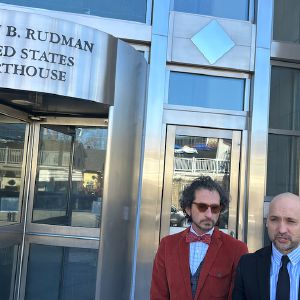Opinion: Restoring reproductive freedom is a matter of democracy

Melissa Countway, currently a New Hampshire circuit court judge, during her nomination hearing Wednesday to the state's highest court.
| Published: 01-22-2024 6:00 AM |
Louise Spencer and Claudia Damon both live in Concord and are members of the Kent Street Coalition.
Late last month, the Executive Council voted 4-1 to confirm Governor Sununu’s nominee to the New Hampshire Supreme Court. The vote was along party lines with the council’s sole Democrat, Cinde Warmington, voting against Melissa Countway to become an associate justice on the Court.
In her statement on the vote, Warmington said Countway had failed to offer any reassurance when asked about her views on state protections for abortion rights, which lost their federal shield in the Dobbs decision in June of 2022. Instead, the nominee cautioned that privacy protections under New Hampshire’s constitution were narrowly drawn. Her response is disappointing because privacy interests formed Roe v Wade’s foundation of the right to terminate a pregnancy. The solution for pro-choice citizens, in Countway’s rendering, is for the people of New Hampshire to pass a constitutional amendment to formally recognize the right to abortion.
Countway’s recommendation may sound simple enough, but it entails surmounting the intricate barriers that have been erected to obstruct the public will here in New Hampshire. Because New Hampshire lacks a referendum or ballot initiative process that half the other states have, and because of extreme gerrymandering in 2022 by Republicans, the effort to enact any constitutional amendment faces daunting odds. Moreover, the very Supreme Court that Countway has now joined recently abdicated any responsibility to review the design or impact of the gerrymandering that has all but locked in a Republican majority in the state Senate for the next decade. In Brown v Secretary of State, the Court held that extreme gerrymandering is an entirely political matter and does not raise “justiciable” issues.
In New Hampshire, constitutional amendments must be proposed by the Legislature, through enactment of a Constitutional Amendment Concurrent Resolution, or CACR, by a 60% vote of both the House of Representatives and the Senate. If passed by the Legislature, the language of the CACR is placed on the general election ballot; if approved by a two-thirds vote of the electorate, it is incorporated into the state constitution. While this procedure may set an appropriately high bar for changing the state’s constitution, in the context of today’s extremely gerrymandered Senate map, it amounts to an anti-democratic obstacle course.
To appreciate the consequences of the Republicans’ 2022 redraw of that map, one need only consider the most recent Senate election results. As of last November, Republicans hold 14 of the 24 Senate seats, amounting to 58% Republican control of that body. However, the votes cast in the 2022 election paint a different picture: 6,023 more Democratic votes were cast in Senate races than Republican votes. The resulting makeup of the Senate simply does not reflect the popular vote, which should have produced a Democratic-controlled body. This politically skewed Senate makeup will have profound policy implications for many fundamental issues, but most especially for those relating to privacy, abortion access and personal bodily integrity.
A CACR to enshrine abortion rights in the New Hampshire Constitution was introduced by a bipartisan group of legislators. The language states affirmatively that every individual has a right to abortion and puts abortion in the hands of doctors and patients, not politicians. In New Hampshire, recent polling finds that 87% of Granite Staters support reproductive freedom. The proposed CACR reflects this overwhelming consensus and the will of the New Hampshire people. The current Republican-gerrymandered House and Senate do not. Instead, they represent artificially created majorities that are unresponsive to the voting public as a whole.
To restore protections for fundamental reproductive freedoms, we must do two things. First, we must support the CACR initiative with all our collective energy and political power. We must insist that legislators set aside their personal views on abortion and put the question of abortion rights to the people. We must hold our legislators accountable for whether they choose to do so.
Article continues after...
Yesterday's Most Read Articles
 After four decades collecting carts, Ricky Tewksbury will retire when Shaw’s closes mid-April
After four decades collecting carts, Ricky Tewksbury will retire when Shaw’s closes mid-April
 NH attorney general asks federal appeals court to reinstate ‘divisive concepts’ law struck down by lower court
NH attorney general asks federal appeals court to reinstate ‘divisive concepts’ law struck down by lower court
 ‘When we talk about promises’ – Keach park light plans grow dim
‘When we talk about promises’ – Keach park light plans grow dim
 Updated Concord middle school design to cost another $3 million
Updated Concord middle school design to cost another $3 million
 Federal judge temporarily reinstates legal status for Dartmouth PhD student from China
Federal judge temporarily reinstates legal status for Dartmouth PhD student from China
 Two injured in accident in Loudon
Two injured in accident in Loudon
Second, we must do all we can to overcome the effects of gerrymandering to elect more pro-abortion representatives and senators in 2024. The electoral maps were rigged in favor of conservative Republican majorities, but their effect is not absolute. A highly motivated electorate can overcome the anti-democratic barriers that Republicans have erected between the Legislature and the will of the people. Recent elections across the country in which abortion was on the ballot or at the center of campaigns convince us that defending abortion rights will highly motivate New Hampshire voters in 2024.
Democracy demands, and we deserve, elected officials who will enact policies that reflect the majority’s values, not marginalize or dismiss people or positions they disagree with. That is what a representative form of government is all about. If the New Hampshire Supreme Court cannot be counted on to protect our fundamental liberties, it will be up to our elected representatives to do so. In 2024, we must double down on our expectations of representative government. We must do this at the State House and at the ballot box.







 Opinion: An attack on the legal profession is an attack on us all
Opinion: An attack on the legal profession is an attack on us all Opinion: HealthTrust's decision to drop anti-obesity medications is a step back in the fight against a chronic disease
Opinion: HealthTrust's decision to drop anti-obesity medications is a step back in the fight against a chronic disease Opinion: Courage and care count
Opinion: Courage and care count
